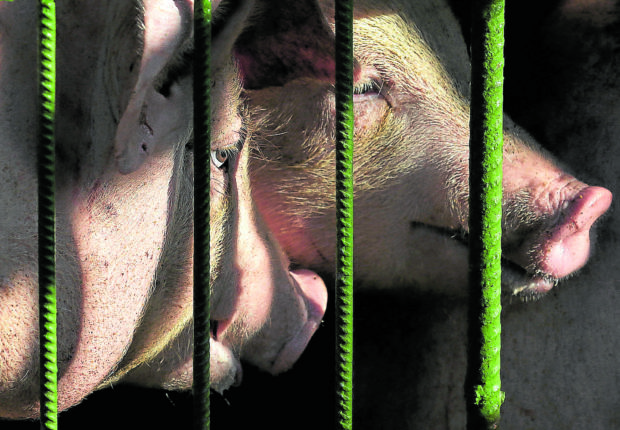
African swine fever has reduced the hog population in Zamboanga City. This photo, which was taken in February 2021, shows hogs from farms in South Cotabato. (File photo by RICHARD A. REYES / Philippine Daily Inquirer)
ZAMBOANGA CITY, Zamboanga del Sur, Philippines — Amid the scourge of the African swine fever (ASF) that has reduced the hog population here in the past months, the City Veterinary Office assured a sufficient supply of pork throughout the Christmas and New Year holidays.
Sellers of caramelized pork and homemade ham, however, noted not only the high prices of pork but also an unusually low demand for their products which used to be holiday bestsellers.
Crisanta Asuncion, 64, said she used to earn better in December because of the high demand for endulsao, a local version of sweetened pork, and homemade ham for the Christmas and New Year celebrations.
But this year, she said pork prices had shot up that she was also forced to increase the price of her products from only P500 a kilo for her endulsao to P700 a kilo; and from P650 a kilo for her cured ham, to P800 a kilo.
Mario Arriola, the city veterinarian, assured there was no shortage of pork, although big supermarkets were already sourcing their pork elsewhere to make up for the dearth of local supply.
“The buying capacity could be the reason why many cannot afford to buy pork now, but we have steady supplies and big supermarkets [are already sourcing] their pork from outside the city,” Arriola said.
Asuncion said she was forced to increase the prices of her products because pork, the main ingredients, now sold at P290 to P300 a kilo from only P230 to P250 a kilo in the previous year. She blamed the increase in prices to the dearth of supply due to the culling of thousands of pigs early this year to stop the spread of ASF.
Hog deaths
Among the affected 133 small-time hog raisers in Mangusu village here, Allan Garcia lost more than 30 pigs in May this year. He said he was still struggling to save and recover so that he could start all over again next year.
Garcia was among the local suppliers that sellers of endulsao and homemade hams, like Asuncion, turn to for their main ingredients.
Arriola said growers in areas heavily affected with ASF, like Mangusu, were not yet allowed to start raising hogs again, as cases still continued to be reported even in September this year.
The city veterinarian said they received reports of some 4,655 hog deaths in the city from May to Dec. 19, although these deaths were not subjected to tests, hence, could not be declared as ASF-related.
“But aside from these reported cases, a total of 1,080 hogs were already culled as of Sept. 15 … because of ASF,” he said.
Records from the city veterinarian’s office also showed that the number of hog raisers whose livestock were affected by ASF had reached 1,098 in 34 villages.